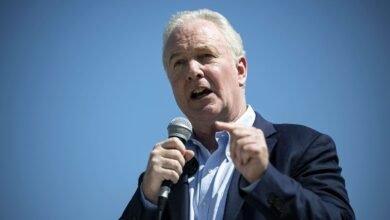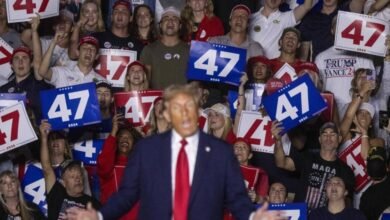‘Trump 2028’ Is No Joke

Since the early days of his rule, Chinese President Xi Jinping has made a regular practice of purging senior members of his country’s military hierarchy. He conjured up corruption in arcane legal proceedings and oversaw public disgrace, exile from the Chinese Communist Party, and imprisonment. In almost every case, Xi and his dedicated propaganda apparatus have made aggressive efforts to consolidate political control over China’s armed forces.
One of the most important tasks for any China researcher these days is to understand why Xi Jinping is so busy concentrating so much power in his hands, and in particular ensuring the obedience of the military. Among his most common potential motivations is one that Xi himself routinely brings up: the need to ensure that China is prepared and ultimately successful in any battle over Taiwan’s future.
Since the early days of his rule, Chinese President Xi Jinping has made a regular practice of purging senior members of his country’s military hierarchy. He conjured up corruption in arcane legal proceedings and oversaw public disgrace, exile from the Chinese Communist Party, and imprisonment. In almost every case, Xi and his dedicated propaganda apparatus have made aggressive efforts to consolidate political control over China’s armed forces.
One of the most important tasks for any China researcher these days is to understand why Xi Jinping is so busy concentrating so much power in his hands, and in particular ensuring the obedience of the military. Among his most common potential motivations is one that Xi himself routinely brings up: the need to ensure that China is prepared and ultimately successful in any battle over Taiwan’s future.
But this is unlikely to fully explain Xi’s sense of purpose. To me, his motives seem to be fueled at least by a desire to perpetuate his own rule, which depends on pre-empting any questioning of his personal authority. In Xi’s view, maintaining absolute control over arms appears, in Mao Zedong’s language, to be a minimum basic requirement for achieving this end. The Chinese leader has already thrown out the rule book that governed Chinese political succession for two five-year terms, and is heading towards what could be his fourth term in office, if he subjects himself to “re-election” procedures by party leaders, as expected, in 2028.
In previous columns, I have written about the ways in which US President Donald Trump’s second term appears to have borrowed the playbook of elite politics in China, which is characterized by muscular authoritarianism and highly personal rule. One of the clearest signs of this was the hollowing out of government institutions in favor of administration by hired politicians loyal to a Mao-like leader during the Cultural Revolution.
But in recent days, it has become clear that Trump is drawing more dire lessons from China – lessons that plausibly reflect Xi Jinping’s obsession with exercising political power over and through the national security apparatus. This was demonstrated in speeches made by Trump and his defense secretary, Pete Hegseth, to a massive and unusual meeting of top US military officers last week at Quantico, along with the unleashing of the National Guard and agents from US Immigration and Customs Enforcement and other federal agencies on several US cities.
Today, Americans, and indeed the world, must prepare for the possibility that Trump shares the goal of perpetuating himself in power with his Chinese counterpart. When Trump recently met with congressional leaders, including Democratic Sen. Chuck Schumer and Rep. Hakeem Jeffries, he seated his guests at a table that prominently displayed “Trump 2028” hats.
For a while, the language about Trump’s third term, repeated in his public musings and the rhetoric of his most impassioned supporters, was widely considered a joke. But if onlookers were able to dismiss such talk in this way, then the time has passed.
Much of the commentary about the Trump-Hegseth event at Quantico focused on the Defense Secretary’s misplaced focus on physical fitness in his ranks and on a right-wing agenda of political correctness regarding gender and diversity issues. Some conservative outlets even described Hegseth’s strutting stage performance as embarrassing. But Trump’s insistence that the US military has a role to play in combating what he called the “enemy within” is the most dangerous moment of the day yet.
In defiance of longstanding traditions and laws, such as the Posse Comitatus Act of 1878, which prohibits the use of US troops in domestic law enforcement, Trump called on the military to begin using the country’s cities as the supposed training bases for its operations.
However, this appears to have less to do with training and more to do with Trump’s insistence on a Xi Jinping-style reorientation of the military to support his personal political agenda and ensure his loyalty. Warning signs about the United States’ slide toward authoritarianism under Trump are hardly new, but the president’s dangerous words and recent actions ordering the militarization of the domestic system represent one of the most significant challenges to American democracy in generations.
In a television interview this week, Illinois Governor J.B. Pritzker warned that the continued deployment of military personnel in American cities was intended to normalize the use of the armed forces internally. “Next year, I’m afraid what they’re going to do is eventually deploy these people at the polls and say they’re protecting the vote,” he said. He added that if the Republican Party loses control of Congress in the 2026 midterm elections, Trump may “do what he said he might do in 2020, which is use the military to confiscate ballot boxes and count votes, claiming fraud.”
Recent weeks have witnessed a whirlwind of other Trump actions that also give rise to growing concerns about his thirst for power, his impatience with checks and balances, and his disregard for the truth.
Far from pressing ahead with recent attempts to assert military control over urban centers in the face of federal court orders, Trump and his supporters have invoked the specter of antifa, a loosely organized and seemingly ephemeral movement of anti-fascists and anarchists, to justify the use of violent tactics against people protesting his policies.
The federalization of law enforcement also targeted suspected illegal immigrants and anyone mobilizing in support of their rights to due process and humane treatment. Such tactics have reached extremes recently in Chicago, where people in poor neighborhoods have been evicted from their apartments or arrested on the streets on suspicion of being in the country illegally – often, from what one can tell, on the basis of their skin color, language, or income level alone.
Meanwhile, while Trump has expressed open hatred toward those who oppose him, he has weaponized the federal budget, punishing states that have traditionally favored the Democratic Party, and freezing or canceling major infrastructure work and other projects.
Even as these many red flags appear, the Trump administration’s recent moves to subjugate America’s armed forces—a politically neutral entity by design and tradition—to its ends remains its most dangerous project.
Through repeated high-level purges of the People’s Liberation Army, Xi has used corruption to remove those he wishes to eliminate and make way for officers who have become personally beholden to him. So far, Trump has been more ambiguous and circumspect than his Chinese counterpart, offering precious few details about the alleged failings of recently ousted military officers. In the case of Xi Jinping, almost all high-level purges have been followed by prosecutions, however vague or formal.
As Secretary of Defense, Hegseth fired highly experienced and decorated officers for no more obvious reason than that they were black, in the case of Gen. Charles Brown Jr., the former chairman of the Joint Chiefs of Staff, or because they were women, in the cases of Admiral Linda Fagan, commandant of the Coast Guard, and Admiral Lisa Franchitti, chief of Naval Operations.
No overt ideological test for promotion or job security has yet been applied in the upper ranks of the armed forces, but tacit conformity with Trump’s policy, not mere obedience to the chain of command, seems to be expected. There is reason to worry that the administration’s repeated disparagement of racial and gender diversity in the military, like Xi’s invocation of corruption, is being used as cover for a broader, more partisan agenda and Trump’s personal dominance of the armed forces.
“More changes in leadership will be made, I’m sure, not because we want to, but because we must,” Hegseth told a crowd of US officers at Quantico. “Again, this is life and death. The sooner we get the right people, the sooner we can develop the right policies.” After a moment, he added: “If the words I speak today make your heart sink, then you should do the honorable thing and resign.”
Don’t miss more hot News like this! Click here to discover the latest in Politics news!
2025-10-08 21:40:00




